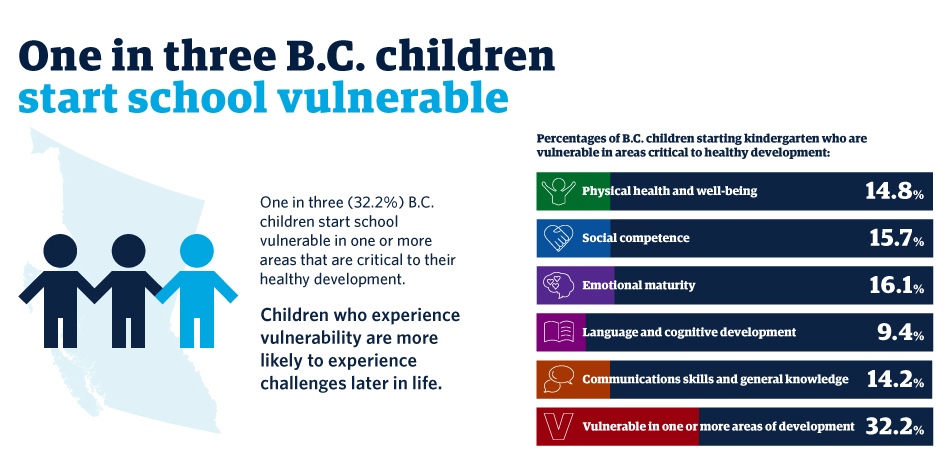Approximately 14,000 British Columbia kindergarten students start school vulnerable in at least one area that is critical to their healthy development, according to a new report from the Faculty of Medicine.
The findings come from the sixth province-wide Early Development Instrument (EDI) data collection by the Human Early Learning Partnership at UBC. The EDI questionnaire gathered information about the well-being of over 43,000 five-year-olds in the province between 2013 and 2016. The data reveal concerning trends that show a decline in the social and emotional well-being of B.C. children.
“For children to develop healthily, it is essential to play, explore, run around, eat healthy food and spend time with caring friends and adults,” said Martin Guhn, an Assistant Professor in the Human Early Learning Partnership, part of the Faculty of Medicine’s School of Population and Public Health. “It sounds simple, but in our society, it’s not. We have to ask ourselves what kind of social and environmental conditions are we creating for our children?”
 The EDI measures the well-being of kindergarten students in five areas: physical health and well-being, social competence, emotional maturity, language and cognitive development, and communication skills and general knowledge. Children who are starting school vulnerable in one or more of those areas are more likely to have difficulties later in life, including struggling with school or experiencing anxiety and depression.
The EDI measures the well-being of kindergarten students in five areas: physical health and well-being, social competence, emotional maturity, language and cognitive development, and communication skills and general knowledge. Children who are starting school vulnerable in one or more of those areas are more likely to have difficulties later in life, including struggling with school or experiencing anxiety and depression.
The researchers say the increase in vulnerability is the result of a complex set of issues such as increased access to technology, living in a fast-paced environment, more financial pressure on parents and caregivers and families with less time to spend with children.
EDI data were first collected in 2001 and the study has been repeated every two to three years since, making it possible to see provincial trends in childhood development. The EDI is intended to inform decisions about policies, programs and services to ensure that children get off to the best start.
Kimberly Schonert-Reichl, Director of the Human Early Learning Partnership (HELP) and a Professor in the Faculty of Education, says that communities and schools across the province are trying to help children build their social and emotional competence.
“B.C. is taking important steps to integrate social and personal competency into the school curriculum. It is the first jurisdiction in North America to introduce such an innovation,” she said.
While the most recent results show a continued decrease in social and emotional well-being of B.C. children, language and cognitive competence seem to be improving. The researchers say that province-wide attention to and investment in early literacy and numeracy programs over the last ten years might explain the trend.
In additional to province-wide EDI results, individual communities and neighbourhoods can access their own data by visiting the HELP website.